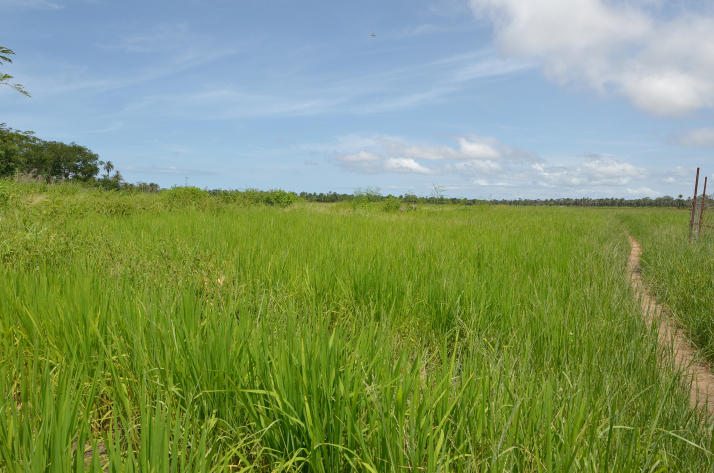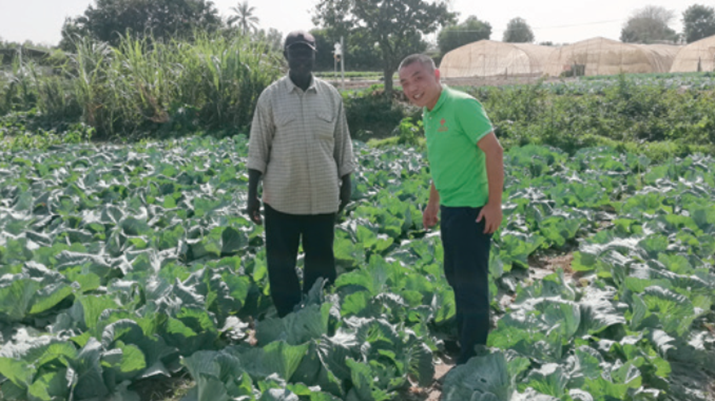|
||||||||||
| Home Nation World Business Opinion Lifestyle ChinAfrica Multimedia Columnists Documents Special Reports |
|
||||||||||
| Home Nation World Business Opinion Lifestyle ChinAfrica Multimedia Columnists Documents Special Reports |
| ChinAfrica |
| Grown in Africa |
| Senegalese farmers grow Chinese vegetables on African soil |
| By Aly Diouf | VOL.12 April ·2020-03-31 |

On this typical February morning, the weather is cool and pleasant in Sangalkam, an agglomeration near Dakar, the capital city of Senegal. Not far from the main square, a green and white sign at the entrance of a compound, flanked by the flags of China and Senegal, informs passersby in both French and Mandarin: "Agricultural Technical Cooperation and Assistance Project. Aid from the Chinese Government." This is the Sangalkam Agricultural Base, where the Chinese expert mission to Senegal is now working.
On the road leading to the main gate, local merchants are trying to sell fruit and vegetables to visitors, including Chinese cabbage, parsley and eggplant. Inside the compound, a few towering trees cannot hide the vast green fields of vegetables, spanning 2.1 hectares of fertile land. Hydraulic installations and some greenhouse crops can be seen nearby.
It is the place Zhou Jianpeng, Director of the Chinese agricultural mission to Senegal, now calls home. He is at the head of the sixth Chinese agricultural assistance mission to Senegal, encompassing 13 members. Chinese horticultural specialists are based in the Sangalkam Base, while those specialized in rice cultivation are working in Podor, a village located a hundred km north of Saint Louis.
As part of an agricultural cooperation agreement signed between Dakar and Beijing, China has been sending agricultural missions to Senegal starting from 2006. The mission of these Chinese technical and agricultural experts, explained Zhou, is to train their Senegalese partners in areas of agricultural techniques, demonstration and selection and cultivation of premium seeds. Chinese experts are responsible for experimenting, demonstrating, initiating the production and selection of quality seeds and organizing comprehensive training related to agricultural techniques. The mission has played an important role in improving the capacity of local market farmers and increasing their yields and incomes, according to the local partners who benefited from the training. One of the most effective approaches has been the introduction of new agricultural practices from China.
According to Zhou, the Chinese missions have introduced around 20 "low-cost, but effective techniques" in Senegal. The Chinese expert teams, he explained, also support local farmers' associations and regularly take part in their training. Chinese experts visit local farmers and give them advice and guidance. They also take part in the training of students from various Senegalese universities by welcoming them to their bases and having them participate in practical tasks. For this, the Chinese experts have set up demonstration points within the bases.
Moreover, the Chinese technical and agricultural mission, according to Zhou, has enabled the introduction into Senegal of several Chinese horticultural varieties. Examples include Chinese cabbage, several varieties of eggplant, five varieties of corn, seven varieties of peanuts, with a yield per hectare of up to 7.2 tons. The mission has also taken part in the purification process of more than 100 of local horticultural varieties.
Jean Pierre Diatta is one of the Senegalese who have greatly benefited from this Chinese agricultural cooperation. Diatta, who is in his 50s, worked with Chinese aid workers to set up an Economic Interest Group. Together with his friends, he now grows a number of Chinese vegetables such as cabbage, which is very popular among local people. After covering their costs, members of the group share the profits from the sale of the crops.
"We are experimenting with many horticultural varieties to see if they adapt well to Senegal. If the experiment is successful, the varieties are then introduced," said Director Zhou. That is exactly what the Chinese experts did with a number of varieties of salad, cabbage, eggplant, pepper, radish, etc. According to Zhou, the main objective of the Chinese mission is to promote the idea that agriculture is an industry and that with adequate training and sufficient investment, one can earn a lot of money from it. Thus, the mission has made emphasizing varieties and techniques one of its priorities.
Senegal, a model partner
As a Master's student at the Training and Research Unit in Political Sciences at the University of Paris 1 Panthéon Sorbonne, Peggy Frey focused her research on trying to better understand the place and the means of Chinese aid in the Senegalese agricultural sector. In her thesis, presented in 2016 and entitled Senegal, the Model Student of Chinafrica: Chinese Presence in Senegalese Agriculture, she wrote that Chinese efforts were no longer limited to training peasants for family-based farming.
Chinese cooperation is now aimed at contributing to the emergence of a modern and productive Senegalese agriculture capable of ensuring food self-sufficiency for the entire country, wrote Frey. For its Chinese partners, Senegal also serves as a successful example to promote its model: the country has become Beijing's "success story" in the Economic Community of West African States (ECOWAS). As such, Senegal is often described as an example of the kind of partnership China is looking to establish in West Africa.
In September 2017, during the Third Invest in Africa Forum held in Dakar, the Chinese Vice Minister of Finance, Shi Yaobin, said that his country would intensify its cooperation with Senegal in various sectors, including infrastructure and agriculture in particular. "We will also promote cooperation in the agricultural sector to fight rural poverty," he added.
On January 9, 2013, China agreed to allocate 877 million FCFA (about $1.4 million) as part of the Economic and Technical Cooperation Agreement to the Chinese technical missions based in the Sangalkam and Podor agricultural bases. This significant investment, according to Xia Huang, the Chinese ambassador at the time, was a "way of boosting agricultural cooperation between the two countries, especially as Senegal is striving to achieve national food self-sufficiency in terms of rice."
"Agriculture is important for the development of a country and sharing experiences is what we need to meet the aspirations of African countries to achieve food security," said Huang.

Zhou Jianpeng (right), Director of the Chinese agricultural mission to Senegal, at a demostration base (ALY DIOUF)
A third base coming?
According to Zhou, the current Chinese expert mission aims to set up a comprehensive agricultural service platform in Senegal using advanced Chinese technologies.
For Modou Fall Thioune, Director of the Sangalkam Agricultural Base, "training means transforming." Several generations of Senegalese farmers are now being trained in the premises of the Sangalkam Agricultural Base in order to transform agriculture and positively influence countrys economic development. In addition to college students specializing in horticulture, the Sangalkam Agricultural Base also welcomes a number of trainees from all over the country.
For Fall Thioune, the next step would be to revitalize the agricultural base by focusing on skills transmission. His wish would to be to see the opening of a third agricultural base specializing in rain-fed crops, such as cassava, sorghum and corn, among others. During a conference on Chinese investments in Africa, organized in Dakar two years ago, the current two Senegalese multipurpose agricultural training bases, which benefit from the help of Chinese technical expert missions, were showcased as concrete examples of successful Sino-Senegalese cooperation in the field of agriculture.
(Reporting from Senegal)
Comments to zanjifang@chinafrica.cn
|
||||||||||||
| About Us | Contact Us | Advertise with Us | Subscribe |
| Copyright Beijing Review All rights reserved 京ICP备08005356号 京公网安备110102005860号 |